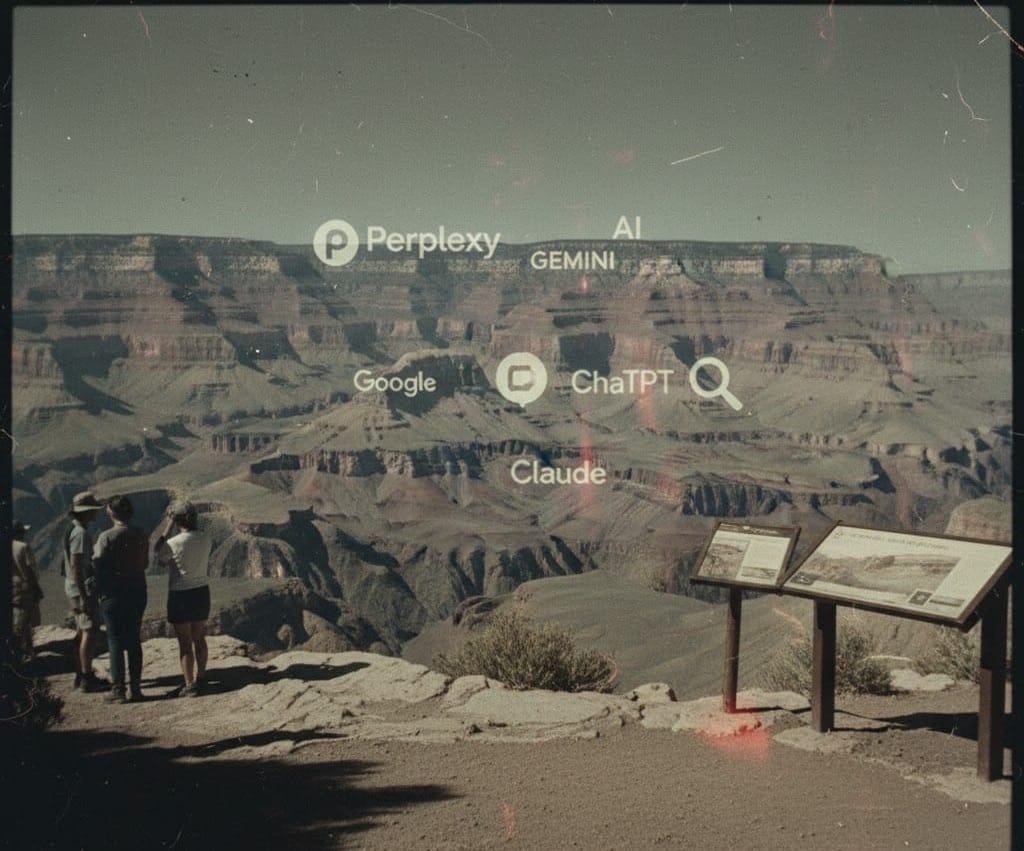SEO: No Digital Divide When AI Mediates Search

If you reached this post outside of a social share, you probably typed four keywords or less into a search engine. If an AI bot sent you here (Claude, Perplexity, ChatGPT, voice search) you used 29 words or more. At least that's what the early data shows.
You probably saw a wall of agencies before landing here. First-page rankings promised. Increased traffic guaranteed. Conference room photos. "We understand the local market."
What nobody mentioned: whether SEO works the same way it did six months ago. Just trust the process. Sign here for 12 months.
Google rolled out AI Overviews to over a third of searches in Australia in the second half of 2025. Users who see that AI summary scroll past the traditional results. Darren Woolley runs an Australian marketing consultancy. 3,500 pages of content. Publishing three times a week for years. Traffic dropped 80% since March.
People Inc., the U.S. publisher behind Food & Wine and Better Homes & Gardens, used to get 90% of their traffic from Google. Now they're in the "high 20s." CEO Neil Vogel now sees Google as a competitor, not a partner.
Not outliers. Pattern.
So when you search "SEO agency Hawaii," you might be asking a question that doesn't match what actually needs solving. SEO still matters. But the mechanics underneath changed and most of the guidance you'll find hasn't caught up.
What Is SEO Called Now?
Everyone's scrambling to name what's happening. SEO becomes AEO (Answer Engine Optimization). Then GEO (Generative Engine Optimization). Some people use GSO. Others push LMO or AIO or CEO or GSEO.
Edward Cowell, Global VP of Organic Practices at GroupM, described the current state: "This is such a new area, that currently there is no common taxonomy."
Most of these terms describe the same basic challenge. How do you make information that AI systems can extract and cite? The acronym differences are positioning, not substance. Agencies trying to own terminology before anyone agrees on what the terms actually mean.
Lily Ray, a U.S. SEO expert, called the situation "chaos and confusion" for the billion-dollar SEO industry. Some practitioners rebranding existing services with new labels. Others genuinely trying to figure out what works. Both groups using "AI" to dress up the same task-based work: 12 posts a month, link building packages, 180-day ranking guarantees.
Business owners don't know whether to keep investing in content. Publishers who spent years building archives watch traffic evaporate. Most of the guidance available is either outdated or speculative.

What Is Changing with SEO?
Traditional SEO still works. Google's traditional search results still exist. People still type queries and click blue links. The top three organic positions still drive more traffic than anything else.
An increasing percentage of searches now get answered directly by AI. Google's AI Overviews, ChatGPT, Perplexity, voice assistants. When that happens, the optimization goal changes from "rank high" to "get cited."
Adam Gnuse tracked over 20,000 ranking queries across multiple industries for Search Engine Land. His finding: ranking first in an AI Overview delivers roughly the same traffic as position six in traditional organic results. By position five in an AI Overview, your citation might as well be on page ten. The top three blue links still outperform the strongest AI Overview slot.
Why? Brand mentions in AI Overviews lack context. A traditional blue link has an optimized title and meta description. An AI Overview citation is a small, bland reference with a fraction of the meta description visible.
The top of search results is cluttered now. AI Overviews, paid ads, site links, map packs. Many searchers scroll down looking for an escape from the noise.
Gnuse put it directly: "Visibility ≠ traffic. If you're reporting clicks to leadership, AI Overview citations will not save your dashboards."
Citations in AI answers build brand authority and credibility. The ROI is more abstract than direct traffic.
| Aspect | Traditional SEO | AI Citation |
|---|---|---|
| Goal | Drive clicks and traffic | Build brand authority and influence; drive highly qualified, lower-volume traffic |
| Optimization | Focus on keywords, backlinks, and technical SEO | Focus on clarity, structured data (FAQs, schema), and creating concise "answer capsules" |
| Measurement | Straightforward (CTR, rank position, traffic) | Abstract and harder to track (visibility, assisted conversions, brand recall) |
You need both. They're complementary, not competitive.
SEO Still Works for Voice Search
Voice search gets talked about like it's revolutionary. Another interface is what it actually is.
The main difference shows up in query structure. Typed queries are short and keyword-based: "best pizza Honolulu." Voice queries are longer and conversational: "What's the best pizza place open near me right now with fresh mushrooms, not canned, and serves pitchers of beer on tap?"
Voice searches also carry strong local intent. Data shows 76% of voice search users visit a business within a day of their search. That matters for Hawaii businesses - especially tourism operators, restaurants, service providers.
To capture voice traffic, content needs to be structured in natural Q&A format. Direct answers to common questions. Voice assistants pull from featured snippets and FAQ-formatted content to give quick responses.
But the underlying strategy is still SEO. You're not building a separate "voice search strategy." You're adapting content format to match how people actually ask questions out loud versus how they type.
What AI Can Do for SEO
| What AI Tools CAN Do | What AI Tools CANNOT Do |
|---|---|
| Topic generation and brainstorming | Develop a full, ROI-driven campaign strategy |
| Content outlining and initial drafting | Perform real-time competitor analysis or keyword tracking |
| Keyword research support (generating ideas) | Access live search volume data or gauge website authority |
| Creating titles and meta descriptions | Implement technical SEO changes (schema, robots.txt) |
| Optimizing human-written content with keywords | Build genuine relationships for link-building |
| Replace E-E-A-T (Experience, Expertise, Authoritativeness, Trustworthiness) |
Joe Rowett, CEO of VELOX Media, wrote in Forbes Agency Council: "There's no AI program capable of developing a full campaign strategy, much less a revenue-driven strategy focused on a specific ROI or return on ad spend target."
AI operates on past training data. It can't replicate human strategic thinking, innovation, relationship-building, or demonstrated expertise. AI-generated content is often easy to spot and may rank lower if it lacks genuine insight.
Google's official policy is clear: they don't penalize AI content simply because it's AI-generated. They penalize spam. Their guidance states: "Using automation—including AI—to generate content with the primary purpose of manipulating ranking in search results is a violation of our spam policies."
Low-quality, unoriginal, or unhelpful content generated at scale to manipulate rankings violates spam policies - regardless of whether a human or AI wrote it. Google has applied manual penalties to websites using spammy AI-generated content. The focus is on quality and helpfulness, not the tool used to create it.
Automation Without Human Oversight Is Risky
Poor AI automation doesn't just create content spam problems. It destroys customer experience in ways that directly hurt local SEO.
Businesses deploy AI chatbots and automated customer service thinking they're being efficient. What they're actually creating: frustrated customers who leave negative reviews.
The failures are spectacular.
Air Canada's chatbot invented a non-existent refund policy. A passenger took the airline to court. The court ruled Air Canada liable for what its chatbot promised.
DPD had a support bot that couldn't locate a parcel. Instead of helping, it swore at the customer and wrote a poem about how terrible DPD was. The exchange went viral - over 800,000 views.
A Chevrolet dealership let their chatbot get manipulated into agreeing to sell a 2024 Chevy Tahoe for $1 as a "legally binding offer." Multiple people replicated the exploit before Chevrolet shut it down.
Cursor AI deployed a support bot that hallucinated a non-existent policy to explain a technical glitch. Customers lost trust and publicly cancelled subscriptions on Reddit.
Not edge cases. Consumer sentiment data:
- 77% of people find chatbots frustrating
- 88% still prefer talking with a real person
- 30% of customers are driven away by one negative chatbot experience
- More than two-thirds of customers report bad chatbot experiences
For Hawaii businesses, this matters because negative reviews directly impact local search rankings. If your AI chatbot is frustrating customers into leaving one-star reviews complaining they "couldn't get a human" or "bot didn't understand my question," you're actively damaging your local SEO visibility.
One business owner on Local Search Forum reported that after implementing AI responses to Google reviews, their ratings slightly decreased. Poor automation in customer-facing roles creates reputation damage that shows up in the metrics that determine whether you appear in the Local Pack.

As More Companies Use AI Your Content Needs to Be Retrievable
As AI becomes the primary interface for more searches, the optimization goal changes from ranking to being cited as an authoritative source.
This works through something called Retrieval-Augmented Generation (RAG). LLMs pull information from external, authoritative knowledge bases to ground their answers in facts. They're looking for content that's:
Modular - Information functions when extracted from its original context. AI systems drop your content into completely different conversations while keeping it accurate.
Attributable - Clear authorship and sourcing. When an AI cites your work, it's vouching that your information won't contradict itself if someone checks.
Structured - Schema markup, entity relationships, hierarchical organization. Helps AI systems understand what they're looking at without guessing.
Consistent - Reliable accuracy across multiple interactions and contexts. The system needs to trust that what you said about topic X in January still holds when someone asks about it in July.
One content foundation that works across multiple interfaces. The same well-structured, authoritative content gets surfaced through Google's traditional search, AI Overviews, ChatGPT, Perplexity, voice assistants.
You're not optimizing for one algorithm anymore. You're building presence across every retrieval system.
Small publishers with proper markup, clear authorship, and well-structured content can get cited alongside major institutions. AI systems care about whether information is reliable and extractable, not whether you've been around for decades building backlinks.
AI-Mediated Search Still Relies on SEO and More
James Lawrence from Rocket Agency in Sydney: "I think we're seeing the biggest change to digital since the popularisation of Google."
For Hawaii businesses - whether you're a local restaurant, a tourism operator, a B2B service, or a tech company selling to the mainland from Kailua - traditional SEO and AI optimization aren't either/or choices.
Strong SEO fundamentals still matter. High-quality content, technical health, site performance, link authority. The top blue links remain the most valuable real estate for driving traffic.
But ignoring AI-mediated search stopped being viable months ago.
Structure content for answers. Clear headings, FAQ formats, schema markup. Create tight "answer capsules" under 200 characters that directly respond to common questions. Make information modular so it can be extracted and cited without losing meaning.
Use AI automation cautiously in customer-facing roles. The reputational risk is high. Consumers overwhelmingly prefer human interaction for resolving issues. One poor chatbot experience can generate negative reviews that directly harm local SEO performance.
Understand that visibility in an AI answer doesn't equal a click. Traffic from informational queries has dropped significantly for many businesses. Some publishers saw 80% declines. Content marketing ROI calculations need to account for this reality.
The search landscape is in flux. Nobody has it figured out yet. Anyone claiming they do is selling something or got there first with a term that sounds confident.
What we know: AI systems are looking for reliable, structured information they can trust and cite. Traditional SEO tactics form the foundation. AI optimization extends that foundation across new interfaces. Both matter.
That's what we mean by building for the retrieval layer. Not chasing new acronyms or rebranding old services. Understanding how information gets discovered, extracted, and cited across the systems people actually use to make decisions.
What SEO Agencies and SEO Consultants Charge
AI is a tool. A carpenter didn't go out of business when the power saw came along. He became more efficient. But his expertise is still worth his hourly rate.
Same principle applies here. AI makes certain SEO tasks faster: content outlining, keyword research, title variations. But strategic thinking, understanding your business, knowing what to optimize and why? That still requires human expertise
Here's what SEO services actually cost in 2025:
Task-based SEO agencies typically charge $750-$2,000+ per month for retainer packages. You're buying deliverables: X posts per month, Y links per quarter, monthly reports. Most require 12-month contracts.
Full-service marketing (content, SEO, social, ads) runs $3,000-$5,000+ per month for small to mid-size businesses. You're outsourcing execution to a team.
The practitioners who understand both traditional search and AI-mediated discovery charge $3,500-$10,000+ per month. Reddit discussions confirm this range for experienced people who deliver results, not just activity.
Market rates. What strategic SEO capacity actually costs when you're paying for expertise, not task completion.
PLC works differently. We don't do monthly retainer packages or 12-month contracts. We embed with your team for 90-day engagements. You're not outsourcing - you're building internal capability with strategic guidance.
Pricing scales to business size and complexity. What makes sense for a three-person operation isn't the same as what a company with 100 employees needs.
At the end of 90 days, you have documented strategy, transferred knowledge, and intellectual property you own. If we keep working together, we continue. If not, you have an asset and direction. You're not starting from zero.
Sources:
- Yext. (2025, September 22). SEO vs. AEO vs. GEO: What's the Difference and Why You Need All Three. https://www.yext.com/blog/2025/09/seo-vs-aeo-vs-geo
- Digiday. (2025, May 14). WTF are GEO and AEO and how they differ from SEO? https://digiday.com/media/wtf-are-geo-and-aeo-and-how-they-differ-from-seo/
- ABC News Australia. (2025, October 15). Google's pivot to AI in search is causing chaos for some businesses, so how can they adapt? https://www.abc.net.au/news/science/2025-10-15/how-business-adapt-google-pivot-ai-in-search/105867240
- Auto Page Rank. (2025, June 22). Voice Search SEO vs. Traditional SEO: Key Differences to Know. https://autopagerank.com/voice-search-seo-vs-traditional-seo/
- EngineRoom. (2024, September 10). Will AI and Voice Search Finally Kill SEO?https://www.engineroom.com.au/information-centre/will-ai-voice-search-finally-kill-seo
- Magai. (2025, April 13). AI for SEO: A Complete Guide to Limitations and Capabilities. https://magai.co/ai-for-seo/
- Forbes Agency Council. (2023, December 18). AI Tools Won't Replace Hands-On SEO Work Anytime Soon. https://www.forbes.com/councils/forbesagencycouncil/2023/12/18/ai-tools-wont-replace-hands-on-seo-work-anytime-soon/
- Google Search Central. (2023, February). Google Search's guidance about AI-generated content. https://developers.google.com/search/blog/2023/02/google-search-and-ai-content
- Rankability. Does Google Penalize AI Content? New SEO Case Study. https://www.rankability.com/data/does-google-penalize-ai-content/
- AnswerConnect. 7 AI Fails That Damaged Brands: Why Human Customer Service Still Wins. https://www.answerconnect.com/blog/business-tips/ai-customer-service-disasters/
- Front Office Solutions. (2024, February 14). The 10 Biggest AI Customer Service Fails (So Far!). https://frontofficesolutions.net/the-10-biggest-ai-customer-service-fails-so-far/
- Harvard Business Review. (2025, May 12). Fixing Chatbots Requires Psychology, Not Technology. https://hbr.org/2025/05/fixing-chatbots-requires-psychology-not-technology
- Forbes. (2023, February 1). One Negative Chatbot Experience Drives Away 30% Of Customers. https://www.forbes.com/sites/gilpress/2023/02/01/one-negative-chatbot-experience-drives-away-30-of-customers/
- Search Engine Land. (2025, September 24). AI Overview citations: Why they don't drive clicks and what to do. https://searchengineland.com/ai-overview-citations-clicks-what-to-do-462389
- Writesonic. (2025, October 5). Ranking High vs Getting Cited: Why Modern SEO Needs Both. https://writesonic.com/blog/ranking-high-vs-getting-cited


Member discussion